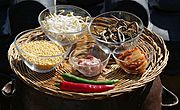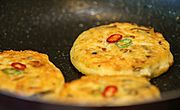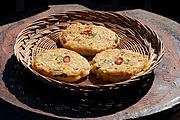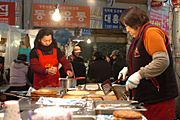Bindae-tteok facts for kids
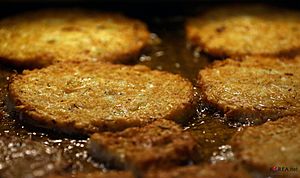
Bindae-tteok being fried in Gwangjang Market
|
|
| Alternative names | Mung bean pancake, nokdu-buchimgae, nokdu-jeon, nokdu-jeonbyeong, nokdu-jijim |
|---|---|
| Type | Buchimgae |
| Place of origin | Korea |
| Associated national cuisine | Korean cuisine |
| Main ingredients | Mung beans |
| 35 kcal (147 kJ) | |
| Other information | |
| Korean name | |
| Hangul |
빈대떡
|
| Revised Romanization | bindae-tteok |
| McCune–Reischauer | pindae-ttŏk |
| IPA | [pin.dɛ̝.t͈ʌk̚] |
Bindae-tteok (빈대떡), or mung bean pancake, is a yummy Korean dish. It is a type of buchimgae (Korean pancake) that first came from the Pyongan Province. This tasty pancake is made by grinding soaked mung beans. Then, vegetables and meat are added. Finally, it is pan-fried into a round, flat shape.
Contents
What's in a Name? The History of Bindae-tteok
Where Did the Name Bindae-tteok Come From?
The name Bindae-tteok has a long history. It first appeared in a cookbook from 1670. This book was called Guidebook of Homemade Food and Drinks. In the book, it was called binja. The word binja might come from an older word, bingjya. This word meant "round and flat pancake-like food." The word Tteok means a steamed, boiled, or pan-fried cake. Usually, it means a rice cake, but for Bindae-tteok, it means a pancake.
How Was Bindae-tteok Eaten in the Past?
During the Joseon era (1392–1897), Bindae-tteok was very important. Richer families would give these pancakes to people who were struggling. They would share them outside the South Great Gate of Seoul. This happened during difficult times. Bindae-tteok was also often eaten in the northwestern parts of Hwanghae-do and Pyeongan-do.
How to Make Bindae-tteok
Bindae-tteok is made with a special batter from mung beans. It also has a yummy filling. This filling often includes bracken, pork, mung bean sprouts, and baechu-kimchi (napa cabbage kimchi).
Preparing the Filling
First, soaked bracken is cut into small pieces. It is mixed with ground pork. Then, it is seasoned with soy sauce, chopped scallions, minced garlic, ground black pepper, and sesame oil.
Next, mung bean sprouts are washed and briefly cooked. They are cut into short pieces. Then, they are seasoned with salt and sesame oil. Kimchi is prepared by removing its fillings and squeezing out extra juice. It is then cut into small pieces. All these ingredients are then mixed together for the filling.
Making the Batter and Frying
To make the batter, washed, soaked, and husked mung beans are ground with water. Salt is added to give it flavor.
A hot frying pan is greased with a lot of cooking oil. The mung bean batter is poured onto the pan. The filling is placed on top of the batter. Then, another layer of batter is poured over the filling. Finally, pieces of sliced green and red chili pepper are placed on top. The pancakes are fried on both sides until golden. They are served with a dipping sauce. This sauce is made from soy sauce, vinegar, water, and ground pine nuts.
Gallery
See also
 In Spanish: Bindaetteok para niños
In Spanish: Bindaetteok para niños
 | Aurelia Browder |
 | Nannie Helen Burroughs |
 | Michelle Alexander |


